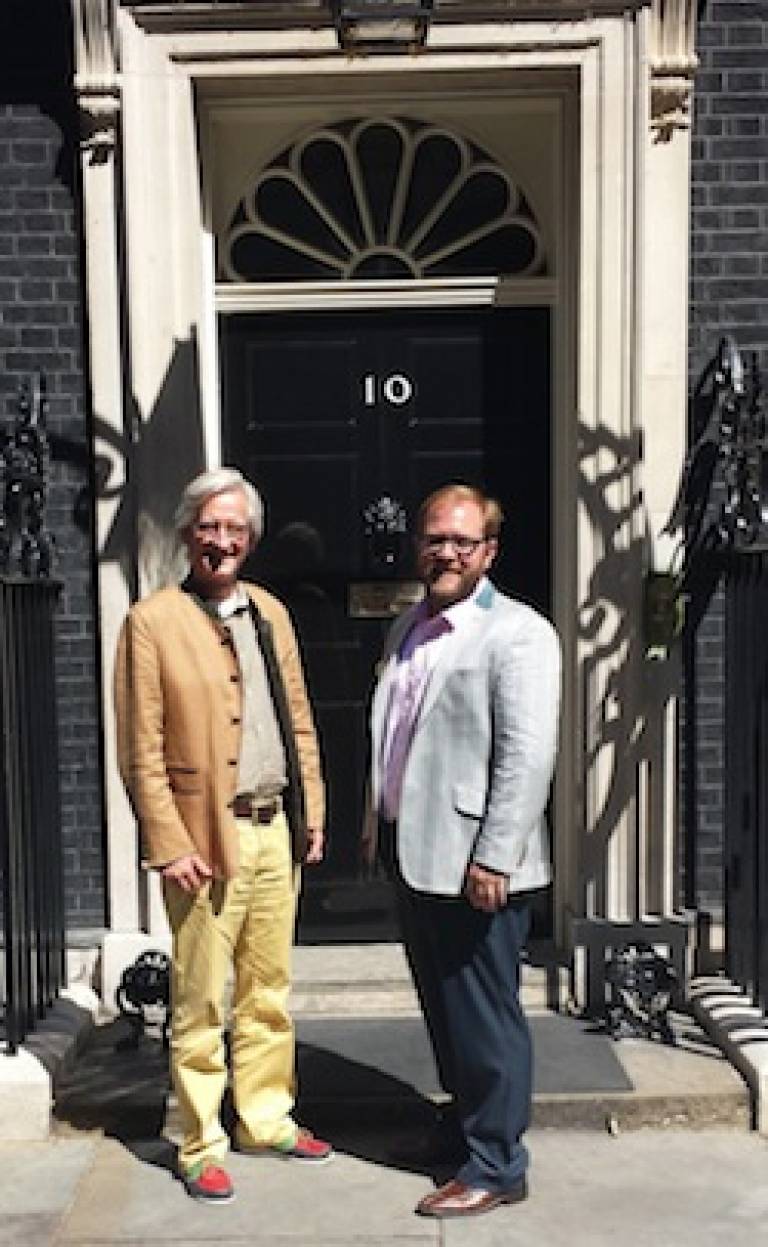Spotlight on Stephan Beck
6 November 2013
This week the spotlight is on Stephan Beck, Professor of Medical Genomics, UCL Cancer Institute Picture: Professor Beck (left) at 10 Downing Street with Jason Bobe (Executive Director, PersonalGenomes.
 org) following a briefing on PGP-UK in August.
org) following a briefing on PGP-UK in August.
What is your role and what does it involve?
I am Professor of Medical Genomics at the UCL Cancer Institute. My laboratory aims to understand how genomic and epigenomic variation results in phenotypic plasticity.
What determines a phenotype or disease is one of the fundamental questions in biology and medicine. In the past, most of the efforts were directed towards the identification of genetic factors but today it is increasingly clear that non-genetic factors are equally important.
Of the many non-genetic factors, epigenetic variations may be the most important. Centred on the study of (somatically) heritable changes in genome function that occur without a change in DNA sequence, epigenetics offers new routes of investigation and insight into phenotypic plasticity in health and disease that cannot be explained by classical genetics.
Altered DNA methylation, for instance, has been shown to correlate with age, diet, drug use, disease and a whole range of other environmental influences. Hence, it constitutes a flexible genomic parameter that can change genome function under exogenous influence.
In other words, it may represent the as-yet 'missing link' between genetics, disease and the environment.
Central to our research is the development of systems approaches for integration of multi-dimensional data and their application to (epi)genome-wide association studies in cancer and other common diseases to advance translational, regenerative and personalised medicine.
At UCL, I spread the 'epigenetics' gospel by teaching on the MSc Cancer, Drug Design and CoMPLEX courses and by trying to offer a stimulating environment for graduate and postdoctoral training. For more details, please visit the UCL Cancer Biology website.
How long have you been at UCL and what was your previous role?
I joined UCL in August 2007, so just over six years. The preceding 11 years, I worked at the Wellcome Trust Sanger Institute in Hinxton where I was fortunate to be part of the most iconic project in molecular science, the Human Genome Project. During my tenure as Head of Human Sequencing, I contributed to the sequencing and analysis of the human, mouse and zebrafish genomes.
What working achievement or initiative are you most proud of?
That will be my genome projects hat-trick. I am thrilled to have contributed to the Human Genome Project, the Human Epigenome Project and the Personal Genome Project.
I guess I caught the genome bug early, back in 1977 as MSc student when my supervisor allowed me to sequence bits of my own DNA using the revolutionary methods that had just been published by Sanger and co-workers Maxam and Gilbert.
Tell us about a project you are working on now which is top of your to-do list
I am excited about all our projects, but right now I am super excited about the UK Personal Genome Project (PGP-UK), which we launched on 6 November.
Using a novel Open Consent protocol for the first time in the UK, PGP-UK data will be linked to medical, health, environmental and other records to create an information-rich public resource that is made available under Open Access to advance both personal and medical genomics.
By engaging and educating the UK public in these areas, PGP-UK will encourage 'citizen science', while at the same time complementing the clinical genome sequencing of NHS patients by Genomics England.
In the UK and many other countries, the prevailing view among researchers, clinicians and politicians is that genomics in one form or another will transform healthcare in the coming decade. PGP-UK will help to prepare the ground for this.
What is your favourite album, film and novel?
I like both classical and modern music, so for classical music it's Mendelssohn's Violin Concerto in E Minor, and for modern music it's Pink Floyd's The Dark Side of the Moon. Both pieces bring back wonderful memories and I can listen to them over and over again.
I rarely watch or read the same film or novel twice, so don't have clear favourites as I do for music.
What is your favourite joke (pre-watershed)?
You must be joking - I am German ;-)
Who would be your dream dinner guests?
If I had a time machine, I would love to ask Charles Darwin, Gregor Mendel and Friedrich Miescher around for dinner and learn what they would think of genomics - the field they contributed so much to without ever knowing.
What advice would you give your younger self?
Since I followed my own advice then and did not regret it, I am happy to extend it to all young researchers, which is "keep sticking to your guns". I was once fired for pursuing research that was then considered not important enough. Few would take that view on epigenetics today.
What would it surprise people to know about you?
My wife is known to refer to me as 'closet pyromaniac' as I love to use our open fireplace as soon as the temperature drops below 20°C when most people would wear T-shirts.
Not me - I am easily cold. When 'foraging' for firewood in my neighbourhood (I live south of Cambridge), it's amazing who you meet with the same phenotype - including Nobel laureates - but I will not tell who, in case we were trespassing.
What is your favourite place?
I love lots of different places all over the world but the Pyrenees are right up there for a special reason. My wife and I enjoy hiking there and the absence of internet/mobile signal is sheer bliss for the holidays.
 Close
Close

